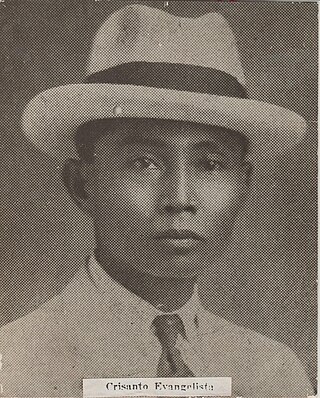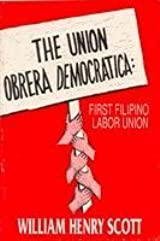History
Establishment
The congress was established on May 1, 1913. Its first convention was attended by 155 representatives from 35 organizations. Participating in its first convention were various occupation groups such as cigar makers, government employees, typographers, lithographers, bookbinders, journalists, sailors, clerks, mechanics, and lawyers. The first COF convention lasted four days. Hermenegildo Cruz was elected president, while Primitivo Cruz was chosen as secretary. [1]
The COF manifesto had five goals:
- resolve labor problems and questions
- write a Labor Code to serve as a guide for workers during strikes or conflicts with management
- set up measures that would lend dignity to the Filipino workers
- establish defined guidelines on how to form trade unions
- resolve all problems concerning labor and those submitted for its consideration. [2]
The official publication of the COF was the Tambuli, which lasted only a year. [2]
Profintern affiliation and organizational split
On June 30, 1927 the COF formally affiliated with the Pan-Pacific Trade Union Secretariat (PPTUS), the Pacific regional subdivision of the Red International of Labor Unions (RILU, commonly known as the Profintern). [3] The organization claimed 70,000 adherents at the time of affiliation with this Communist International-backed organization. [3] This affiliation exacerbated a growing division between revolutionary left and reformist right wings of the labor organization, with the radicals headed by Philippine Communist leader Crisanto Evangelista and the moderates by one Tejada of the Philippine Tobacco Workers Union. [4]
Factional battling on the Executive Committee of the COF preceded an all out battle at the 1929 convention of the organization, in which radicals charged that moderates attempted to pack the gathering, with 188 delegates instead of its assigned 54 appearing to represent the Tobacco Workers' Union and another 65 materializing from a tiny 250 member Stevedores' Union. [4] The matter was referred to the convention's Credentials Committee, which expressed misgivings about the situation. [4] Chairman of the convention Tejada put the matter to the congress itself, which voted to accept the challenged delegates, thereby provoking a split by about half the delegates. [4] These reassembled elsewhere in a "provisional conference" which launched a rival organization called the "Congreso Obrero de Filipinas (proletariat)." [4] A formal congress to establish this parallel organization was called for May 12, 1929. [4]
Dissolution
Although the COF was still around by 1937, by this juncture the federation continued only as a paper organization. [5]

Isabelo de los Reyes Sr. y Florentino, also known as Don Belong, was a prominent Filipino patriot, politician, writer, journalist, and labor activist in the 19th and 20th centuries. He was the original founder and proclaimer of the Iglesia Filipina Independiente, the first-ever Filipino independent Christian Church in history in the form of a nationalist church, which was proclaimed in 1902. He is popularly known today as the "Father of Philippine Folklore", the "Father of the Philippine Labor Movement", and the "Father of Filipino Socialism".

The Red International of Labor Unions, commonly known as the Profintern, was an international body established by the Communist International (Comintern) with the aim of coordinating communist activities within trade unions. Formally established in 1921, the Profintern aimed to act as a counterweight to the influence of the so-called "Amsterdam International", the social-democratic International Federation of Trade Unions, an organization which the Comintern branded as "class-collaborationist" and as an impediment to revolution. After entering a period of decline in the middle 1930s, the Profintern was finally dissolved in 1937 with the advent of Comintern's "Popular Front" policy.
The National Minority Movement was a British organisation, established in 1924 by the Communist Party of Great Britain, which attempted to organise a radical presence within the existing trade unions. The organization was headed by longtime unionist Tom Mann and future General Secretary of the CPGB Harry Pollitt.

Crisanto Abaño Evangelista was a Filipino communist politician and labor leader of the first half of the 20th century. He is credited as being one of the founders of the Partido Komunista ng Pilipinas. Evangelista was also an influential head of the Congreso Obrero de Filipinas, at the time the foremost and largest trade federation in the Philippines, having served as secretary for multiple years. He also headed the Union de Impresores de Filipinas as its Secretary-General. Prior to forming the PKP, Evangelista was a member of the Partido Obrero de Filipinas, a Filipino workers' party with increasingly radical leanings. Evangelista was eventually captured by the Japanese during the Second World War and executed.
When Bill Haywood used a board to gavel to order the first convention of the Industrial Workers of the World (IWW), he announced, "this is the Continental Congress of the working class. We are here to confederate the workers of this country into a working class movement that shall have for its purpose the emancipation of the working class..."

The Partido Komunista ng Pilipinas-1930 (PKP-1930), also known as the Philippine Communist Party, is a communist party in the Philippines that was established on November 7, 1930. It uses the aforementioned appellation in order to distinguish itself from its better known splinter group, the Communist Party of the Philippines.
The Pan-Pacific Trade Union Secretariat (PPTUS) was a regional subdivision of the Red International of Labor Unions, the trade union organization associated with the Communist International. Established in Hankou, China, in May 1927, the PPTUS attempted to coordinate communist activity in the organized labor movement of China and the Pacific basin, including particularly Japan, Korea, Indonesia, the Philippines, Australia, and the United States.
Guillermo Capadocia (1909–1951) was a Filipino communist politician and labour leader. He was a prominent leader of the Communist Party in the Philippines (PKP) and different labour movements. During the last one and a half years of his life he was a regional guerrilla commander of the Hukbalahap.
The Collective Labor Movement was a trade union centre in the Philippines. The CLM was founded in 1938 and consisted of 76 radical and liberal trade unions. It represented a regroupment of the leftist sectors of the Filipino trade union movement. CLM was the largest labour organization in the country in the years in the run-up to the Second World War.

The Unión Obrera Democrática Filipina was a trade union center in the Philippines. The organization was considered as the first-ever modern trade union federation in the history of the country, composed of unions from various labor industries; earlier and prior labor groups had been more of mutual aid societies and guilds. The organization had thirty-three affiliated trade unions as of 1902. In 1903, the organization counted 150 affiliated unions, with around 20,000 members in the Manila area. At its peak, the Union Obrera Democratica had approximately 150,000 members in eight provinces of Luzon. Its members were also the very first members of the Philippine Independent Church when it was proclaimed in 1902.

The 2nd World Congress of the Communist International was a gathering of approximately 220 voting and non-voting representatives of communist and revolutionary socialist political parties from around the world, held in Petrograd and Moscow from July 19 to August 7, 1920. The 2nd Congress is best remembered for formulating and implementing the 21 Conditions for membership in the Communist International.

The International Brotherhood of Stationary Firemen (IBSF) was an American trade union established in 1898 and affiliated with the American Federation of Labor. The union was established as a mechanism for advancing the collective interests of workers engaged in the operation of steam boilers. Originally limited to stationary firemen, in 1919 the AF of L expanded the organization's jurisdictional mandate to oilers and boiler room helpers, and the name was changed to International Brotherhood of Stationary Firemen and Oilers (IBSFO).
Communism in the Philippines emerged in the first half of the 20th century during the American Colonial Era of the Philippines. Communist movements originated in labor unions and peasant groups. The communist movement has had multiple periods of popularity and relevance to the national affairs of the country, most notably during the Second World War and the Martial Law Era of the Philippines. Currently the communist movement is underground and considered an insurgent movement by the Armed Forces of the Philippines.

Hermenegildo Cruz (1880–1943) was a Filipino writer and prominent trade union organizer.
The Partido Obrero de Filipinas was a Marxist political party formed in 1924 by Filipino labor organizers Crisanto Evangelista, Domingo Ponce and Cirilo Bognot during the administration of the Insular Government of the Philippine Islands. This party later formed the core of the Partido Komunista ng Pilipinas which was established in 1930.

The Unión de Impresores de Filipinas was one of the first national trade union centers in the Philippines, along with the Unión Obrera Democrática Filipina. Established in 1906, it was a national union of all workers in the printing trade intended to consolidate them into a single confederation.

The Katipunan ng mga Anak-Pawis sa Pilipinas (KAP) was the third trade union federation in the Philippines. It was formed in 1929 after an antagonistic national convention of the Congreso Obrero de Filipinas where election results were manipulated caused Crisanto Evangelista and his faction to split from the COF. In 1930, the KAP changed its name to Partido Komunista ng Pilipinas after it initiated the formation of a "mass political party" and questions arose regarding its name.
The Congress of Labor Organizations (CLO) was a trade union federation in the Philippines. It was formed in 1945 by Hukbalahap guerillas who had been members of the Collective Labor Movement. Its first president was Cipriano Cid of the Philippine Trade Union Council. The CLO controlled labor unions in all major industries in Panay and Manila, representing a significant percentage of the organized labor force therein and was the dominant labor federation of the period immediately after World War II.
Florentino D. Tecson was a Filipino Visayan lawyer, politician, editor, writer, and labor leader from Cebu, Philippines. He edited pre-war Cebuano periodicals such as Bag-ong Kusog and published his own newspaper, Ang Mamumuo, and a book of fiction, Lingawon Ko Ikaw. A known labor leader, he was the president of Federacion Obrero de Filipinas. He served as councilor of Naga and Cebu City and was appointed as Vice Mayor of Cebu City (1954–1955).
Anarchism in the Philippines has its roots in the anti-colonial struggle against the Spanish Empire, becoming influential in the Philippine Revolution and the country's early trade unionist movement. After being supplanted by Marxism-Leninism as the leading revolutionary tendency during the mid-20th century, it experienced a resurgence as part of the punk subculture, following the fragmentation of the Communist Party of the Philippines.










